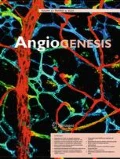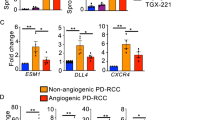Abstract
Tumor angiogenesis is a process that requires migration, proliferation, and differentiation of endothelial cells. We hypothesized that decrease in pancreatic tumor growth due to inhibition of Src activity is associated with the inability of Src kinase to trigger a network of such signaling processes, which finally leads to endothelial cell death and angiogenesis-restricted tumor dormancy. The therapeutic efficacy of Src kinase inhibitor AZM475271 was tested in nude mice orthotopically xenografted with L3.6pl pancreatic carcinoma cells. No liver metastases and peritoneal carcinosis were detected and a significant effect on the average pancreatic tumor burden was observed following treatment with AZM475271, which in turn correlated with a decrease in cell proliferation and an increase in apoptotic endothelial cells. AZM475271 was shown to significantly inhibit migration of human umbilical vein endothelial cells in an in vitro Boyden Chamber cell migration assay. In a rat aortic ring assay we could demonstrate as well inhibition of endothelial cell migration and sprouting following therapy with Src kinase inhibitor at similar doses. The most conclusive anti-angiogenic activity of AZM475271 was demonstrated in vivo (mouse corneal micropocket assay) by showing a marked inhibition of basic fibroblast growth factor-induced neovascularization in response to systemic administration of AZM475271. Furthermore, we could show reduced proliferation of HUVECs determined with the TACS MTT Cell Viability Assay Kit. The blockade of Src kinase significantly reduced the level of VEGF in L3.6pl medium, the effect which was found also in the cell culture supernate from HUVECs. Inhibition of Src kinase by AZM475271 also showed prevention of survival signaling from VEGF and EGF receptors. Treatment with AZM475271 resulted in VEGF - dependent inhibition of tyrosine phosphorylation of FAK. HUVECs were also examined using propidium iodide staining for cell cycle analysis by FACS. Inhibition of Src kinase promoted HUVEC apoptosis in a dose-dependent manner. Taken together, our results suggest that the Src kinase inhibitor AZM475271, in addition to its effects on tumor cells, suppresses tumor growth and metastasis in vitro and in vivo potentially also by anti-angiogenic mechanisms.











Similar content being viewed by others
References
Folkman J (1995) Tumor angiogenesis, in the molecular basis of cancer. W.B. Saunders, Philadelphia, pp 206–232
Kerbel RS (2000) Tumor angiogenesis: past, present, and the near future. Carcinogenesis 21:505–515
Pepper MS (1997) Manipulating angiogenesis. From basic science to the bedside. Arterioscler Thromb Vasc Biol 17:605–619
Carmeliet P, Dor Y, Herbert J-M, Keshet E (1998) Role of HIV-1α in hypoxia-mediated apoptosis, cell proliferation and tumour angiogenesis. Nature 394:485–490
Relf M et al (1997) Expression of the angiogenic factors in human primary breast cancer and its relation to angiogenesis. Cancer Res 57:963–969
Fukumura D et al (1998) Tumor induction of VEGF promoter activity in stromal cells. Cell 94:715–725
Mukhadopathyay D, Tsiokas L, Zhou XM, Foster D, Brugge JS, Sukhatme VP (1995) Hypoxic induction of human vascular endothelial growth factor expression through c-Src activation. Nature 375:577–581
Jiang BH, Semenza GL (1997) V-Src induces expression of hypoxia-inducible factor 1 (HIF-1) and transcription of genes encoding vascular endothelial growth factor and anolase 1: involvement of HIV-1 in tumor progression. Cancer Res 57:5328–5335
Kerbel RS, Rak J (1998) Establishing a link between oncogenes and tumor angiogenesis. Mol Med 4:286–295
Okada F, Kerbel RS (1998) Impact of oncogenes in tumor angiogenesis: mutant K-ras up-regulation of VEGF/vascular permeability factor is necessary, but not sufficient for tumorigenicity of human colorectal carcinoma cells. Proc Natl Acad Sci USA 95:3609–3614
Kypta RM, Goldberg Y, Ulug ET, Courtneidge SA (1990) Association between the PDGF receptor and members of the Src family of tyrosine kinases. Cell 62:481–492
Arbiser JL, Folkman J (1997) Oncogenic H-ras stimulates tumor angiogenesis by two distinct pathways. Proc Natl Acad Sci USA 94:861–866
Verbeek BS, Vroom TM, Adriaansen-Slot SS, Ottenhoff-Kallf AE, Geertzema JG, Hennipman A, Rijksen G (1996) c-Src protein expression is increased in human breast cancer. An immunohistochemical and biochemical analysis. J Pathol 180:383–388
Egan C, Pang A, Durda D, Cheng HC, Wang JH, Fujita DJ (1999) Activation of Src in human breast tumor cell lines: elevated levels of phosphotyrosine phosphatase activity that preferentially recognizes the Src carboxy terminal negative regulatory tyrosine 530. Oncogene 18:1227–1237
Bolen JB, Veillette A, Schwartz AM, DeSeau V, Rosen N (1987) Activation of pp60c-Src protein kinase activity in human colon carcinoma. Proc Natl Acad Sci USA 84:2251–2255
Cartwright CA, Meisler AI, Eckhart W (1990) Activation of the pp60c-Src protein kinase is an early event in colonic carcinogenesis. Proc Natl Acad Sci USA 87:558–562
Irby RB, Mao W, Coppola D, Kang J, Loubeau JM, Trudeau W, Karl R, Fujita DJ, Jove R, Yeatman TJ (1999) Activating Src mutation in a subset of advanced human colon cancers. Nat Genet 21:187–190
Lutz MP, Esser IB, Flossmann-Kast BB, Vogelmann R, Luhrs H, Friess H, Buchler MW, Adler G (1998) Overexpression and activation of the tyrosine kinase Src in human pancreatic carcinoma. Biochem Biophys Res Commun 243:503–508
Visser CJ, Rijksen G, Woutersen RA, de Weger RA (1996) Increased immunoreactivity and protein tyrosine kinase activity of the protooncogene pp60c-Src in preneoplastic lesions in rat pancreas. Lab Invest 74:2–11
Alonso G, Koegl M, Mazurenko N, Courtneidge SA (1995) Sequence requirements for binding of Src family tyrosine kinases to activated growth factor receptors. J Biol Chem 270:9840–9848
Belsches-Jablonski AP, Biscardi JS, Peavy DR, Tice DA, Romney DA, Parsons SJ (2001) Src family kinases and HER2 interactions in human breast cancer cell growth and survival. Oncogene 20:1465–1475
Paul MK, Mukhopadhyay AK (2004) Tyrosine kinase – role and significance in cancer. Int J Med Sci 1(2):101–115
Andreev J, Galisteo ML, Kranenburg O, Logan SK, Chiu ES, Okigaki M, Cary LA, Moolenaar WH, Schlessinger J (2001) Src and Pyk2 mediate G-protein-coupled receptor activation of epidermal growth factor receptor (EGFR) but are not required for coupling to the mitogen-activated protein (MAP) kinase signaling cascade. J Biol Chem 276:20130–20135
Simeonova PP, Wang S, Hulderman T, Luster MI (2002) c-Src-dependent activation of the epidermal growth factor receptor and mitogen-activated protein kinase pathway by arsenic. Role in carcinogenesis. J Biol Chem 277(4):2945–2950
Eliceiri BP, Paul R, Schwartzberg PL, Hood JD, Leng J, Cheresh DA (1999) Selective requirement for Src kinases during VEGF-induced angiogenesis and vascular permeability. Mol Cell 4:915–924
Sato M, Tanaka T, Maeno T, Sando Y, Suga T, Maeno Y, Sato H, Nagai R, Kurabayashi M (2002) Inducible expression of endothelial PAS domain protein-1 by hypoxia in human lung adenocarcinoma A549 cells. Role of Src family kinases-dependent pathway. Am J Respir Cell Mol Biol 26(1):127–134
Fujioka S, Yoshida K, Yanagisawa S et al (2002) Angiogenesis in pancreatic carcinoma: thymidine phosphorylase expression in stromal cells and intratumoral microvessel density as independent predictors of overall and relapse-free survival. Cancer 92:1788–1797
Stipa F, Lucandri G, Limiti MR et al (2002) Angiogenesis as a prognostic indicator in pancreatic ductal adenocarcinoma. Anticancer Res 22:445–449
Kuehn R, Lelkes PI, Bloechle C, Niendorf A, Izbicki JR (1999) Angiogenesis, angiogenic growth factors, and cell adhesion molecules are upregulated in chronic pancreatic diseases: angiogenesis in chronic pancreatitis, and in pancreatic cancer. Pancreas 18:96–103
Baker CH, Solorzano CC, Fidler IJ (2002) Blockage of vascular endothelial growth factor receptor and epidermal growth factor receptor signaling for therapy of metastatic human pancreatic cancer. Cancer Res 62:1996–2003
Bruns CJ, Harbison MT, Kuniyasu H, Eue I, Fidler IJ (1999) In vivo selection and characterization of metastatic variants from human pancreatic adenocarcinoma by using orthotopic implantation in nude mice. Neoplasia 1:50–62
Bruns CJ, Solorzano CC, Harbison MT, Ozawa S, Tsan R, Fan D, Abbruzzese J, Traxler P, Buchdunger E, Radinsky R, Fidler IJ (2000) Blockade of the epidermal growth factor receptor signaling by a novel tyrosine kinase inhibitor leads to apoptosis of endothelial cells and therapy of human pancreatic carcinoma. Cancer Res 60(11):2926–2935
Nicosia RF, Ottineri AA (1990) Growth of microvessels in serum-free matrix culture of rat aorta: a quantitative assay of angiogenesis in vitro. Lab Invest 63:115–122
Kenyon BM, Voest EE, Chen CC, Flynn E, Folkman J, D’Amato RJ (1996) A model of angiogenesis in the mouse cornea. Invest Ophthalmol Vis Sci 37(8):1625–1632
Lu Y, Yu Q, Liu JH et al (2003) Src family protein-tyrosine kinases alter the function of PTEN to regulate phosphatidylinositol 3-kinase/AKT cascades. J Biol Chem 278:40057–40066
Parsons JT, Martin KH, Slack JK, Taylor JM, Weed SA (2000) Focal adhesion kinase: a regulator of focal adhesion dynamics and cell movement. Oncogene 19(49):5606–5613
Calalb MB, Polte TR, Hanks SK (1995) Tyrosine phosphorylation of focal adhesion kinase at sites in the catalytic domain regulates kinase activity: a role for Src family kinases. Mol Cell Biol 15(2):954–963
Gasparini G (1999) The rationale and future potential of angiogenesis inhibitors in neoplasia. Drugs 58:17–38
Kerbel RS (1997) A cancer therapy resistant to resistance. Nature 390:335–336
Kumar S, Ghellal A, Li C, Byrne G, Haboubi N, Wang JM, Bundred N (1999) Breast carcinoma: vascular density determined using CD105 antibody correlates with tumor prognosis. Cancer Res 59:856–861
Fontanini G, Vignati S, Bigini D, Lucchi M, Mussi A, Basolo F, Angeletti CA, Bevilacqua G (1996) Neoangiogenesis: a putative marker of malignancy in non-small-cell lung cancer (NSCLC) development. Int J Cancer 67:615–619
Tanigawa N, Amaya H, Matsumura M, Lu C, Kitaoka A, Matsuyama K, Muraoka R (1997) Tumor angiogenesis and mode of metastasis in patients with colorectal cancer. Cancer Res 57:1043–1046
Tanigawa N, Amaya H, Matsumura M, Shimomatsuya T (1997) Correlation between expression of vascular endothelial growth factor and tumor vascularity, and patient outcome in human gastric carcinoma. J Clin Oncol 15:826–832
Yezhelyev M, Koehl G, Guba M, Brabletz T, Jauch KW, Ryan A, Barge A, Green T, Fennell M, Bruns CJ (2004) Inhibition of SRC tyrosine kinase as treatment for human pancreatic cancer growing orthotopically in nude mice. Clin Cancer Res 10(23):8028–8036
Kleespies A, Jauch KW, Bruns CJ (2006) Tyrosine kinase inhibitors and gemcitabine: new treatment options in pancreatic cancer? Drug Resist Updat 9(1–2):1–18
Ito H, Gardner-Thorpe J, Zinner MJ, Ashley SW, Whang EE (2003) Inhibition of tyrosine kinase Src suppresses pancreatic cancer invasiveness. Surgery 134(2):221–226
Duxbury MS, Ito H, Zinner MJ, Ashley SW, Whang EE (2004) Inhibition of SRC tyrosine kinase impairs inherent and acquired gemcitabine resistance in human pancreatic adenocarcinoma cells. Clin Cancer Res 10(7):2307–2318
Ellis LM, Staley CA, Liu W et al (1998) Down-regulation of vascular endothelial growth factor in a human colon carcinoma cell line transfected with an antisense expression vector specific for c-Src. J Biol Chem 273:1052–1057
Schlessinger J (2000) New roles for Src kinases in control of cell survival and angiogenesis. Cell 100:293–296
Frame M (2002) Src in cancer: deregulation and consequences for cell behavior. Biochem Biophys Acta 1062:114–130
Fidler IJ, Ellis LM (1994) The implications of angiogenesis for the biology and therapy of cancer metastasis. Cell 79:185–188
Folkman J (1995) Angiogenesis in cancer, vascular, rheumatoid and other diseases. Nat Med 1:27–31
Brooks PC, Stromblad S, Sanders LC, von Schalscha TL, Aimes RT, Stetler-Stevenson WG, Quigley JP, Cheresh DA (1996) Localization of matrix metalloproteinase MMP-2 to the surface of invasive cells by interaction with integrin alpha v beta 3. Cell 85(5):683–693
Acknowledgements
The authors thank Sabine Schrepfer, Martin Luckner und Michael Brückel for their excellent technical assistance. This research was supported by a grant of the clinical research group KFO 128/1-1 of the Deutsche Forschungsgemeinschaft (DFG), the Wilhelm-Sander-Stiftung (Nr. 2003.133.1) and the research grant BR 1614/3-1of the Deutsche Forschungsgemeinschaft (DFG). This report includes data by Ivan Ischenko in fulfillment of the requirements for his doctoral thesis.
Author information
Authors and Affiliations
Corresponding author
Rights and permissions
About this article
Cite this article
Ischenko, I., Guba, M., Yezhelyev, M. et al. Effect of Src kinase inhibition on metastasis and tumor angiogenesis in human pancreatic cancer. Angiogenesis 10, 167–182 (2007). https://doi.org/10.1007/s10456-007-9071-3
Received:
Accepted:
Published:
Issue Date:
DOI: https://doi.org/10.1007/s10456-007-9071-3




